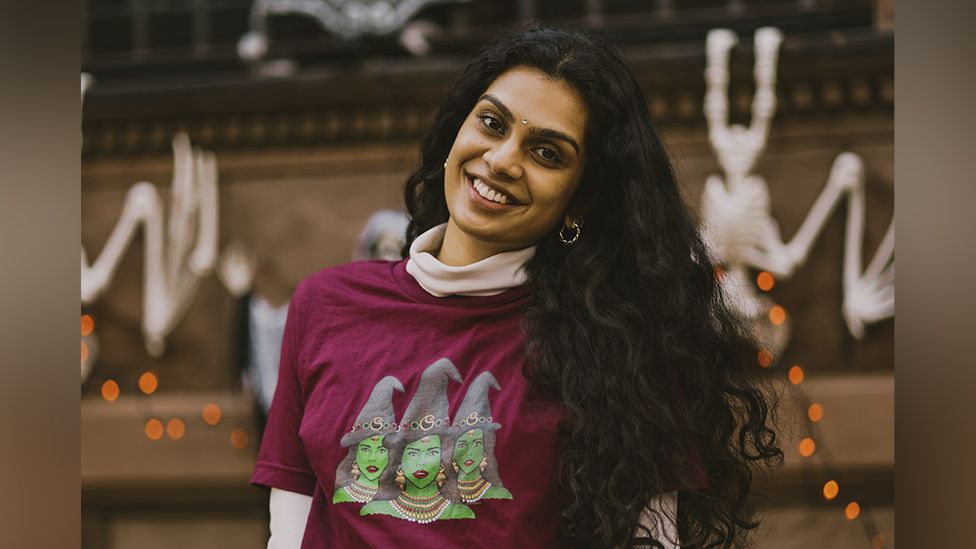Halloween: Artist's desi designs bridge the gap between cultures
Image source, Manasi Arya
Image caption,Manasi Arya says she found Halloween difficult as a child because it "wasn't a thing" in her Indian household

By Jasmine Sandhar
BBC Newsbeat
Growing up, ghouls, ghosts and monsters weren't the biggest fear for artist Manasi Arya at Halloween.
A first generation Indian-American immigrant, Manasi found it "difficult to fit in" at school during spooky season.
She wanted to dress up like other children but couldn't, because the American holiday "wasn't a thing" at home.
So instead of buying a Halloween costume, her mum would tell her to "just wear an Indian outfit".
However, the mother-daughter pair entered a pumpkin competition with a design of an Indian woman wearing traditional jewellery.
After they won, Manasi realised that the two parts of her identity could co-exist.
Skeletons wearing jhumkas
Manasi says that experience inspired her collection of clothing featuring South Asian women in traditional cultural dress meshed with classic Halloween images.
For example, one of her T-shirts has the iconic mask that Ghostface wears in the horror movie franchise Scream, but with the addition of a red bindi dot on the forehead.
Another shows a skeleton wearing big Indian earrings known as jhumkas and a headpiece called a tikka.
Manasi said that there has been "an overwhelmingly positive response" to the line, which she started three years ago.
She says that Indian parents have thanked her for giving them a way to introduce their children to who they are in a "fun but educational" way.
But there is a more serious dimension to Manasi's work, with debates about what's acceptable to wear for Halloween circling on social media for some time.
Some people say it's fine to dress up as the icons they look up to, while others criticise them for "cosplaying" characters from different cultures.
Image source, Manasi Arya
Image caption,Manasi says she wants her clothing line to open up conversations about appropriation and appreciation
That's something Black British influencer, activist and musician Solana has experienced herself.
Earlier this month Solana posted a TikTok about doing the the Leeds Otley Run - a popular student pub crawl - last year, when she encountered a white man wearing a "Jamaican" costume with an afro wig.
After seeing Solana and her black friends sitting across from him, she says the man removed the wig.
Solana says: "Why would they feel the need to do that if the costume they were wearing was okay?"
She insists "cultures are not costumes" and if people want to dress up "the focus should be less on cultural stereotypes" and more on emulating a personal sense of style.
Manasi says some costume choices owe a lot to people being "ignorant" of cultural dress and its origin.
She says she once confronted a white girl wearing a bindi, who did not know its significance to Hindus as a third eye and thought it was just a "pretty" decoration.
Manasi hopes her clothing line will provide people with a way to learn more about South Asian culture and open up a conversation about the line between appropriation and appreciation.
She says she's "comfortable with anyone" wearing her clothing because it is "mostly T-shirts, sweaters, and denim".
But it seems that her designs are giving younger people the inspiration Manasi missed when she was a child.
She says one young Indian girl told her she was "inspired" by her art, so dressed up as a "desi witch" for Halloween, complete with a green and black sari with a witch's hat.
Listen to Newsbeat live at 12:45 and 17:45 weekdays - or listen back here.
Related Topics



















































